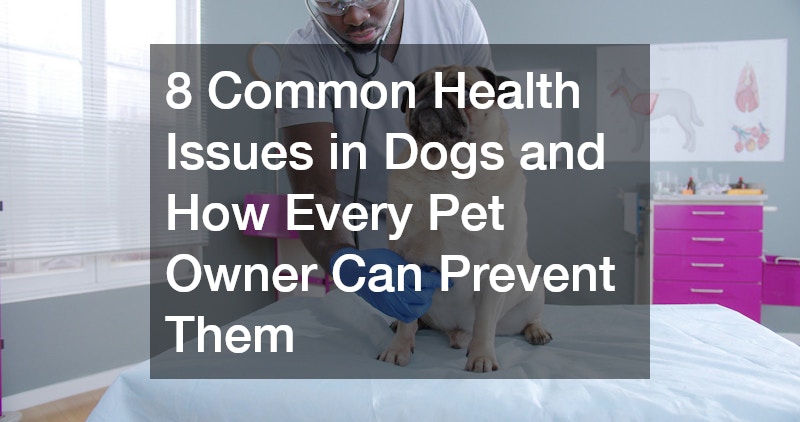
Dogs have a way of stealing our hearts — and like any family member, their health deserves our full attention. Whether you’ve got a bouncy puppy or a wise old senior, certain health problems are surprisingly common among our four-legged friends. The good news? With some awareness and preventive care, many of these issues can be managed or avoided entirely.
Below, we’ll walk through eight common health concerns dogs face — from itchy skin to joint pain — and share practical ways to keep your pup happy, comfortable, and thriving.
Itchy Skin and Allergies — When Scratching Becomes Too Much
A little scratching is normal, but if your dog seems to be constantly biting, licking, or rubbing against furniture, it might be more than just an itch. Skin allergies are one of the most frequent reasons for vet visits, and they can make your pup miserable.
Common culprits include environmental allergens like pollen, mold, or dust mites, as well as food sensitivities or reactions to fleas. Seasonal itching is typical, but chronic skin irritation can lead to infections if left untreated. In some cases, pet skin problems can be linked to external factors like pests or poor grooming habits, making it important to stay consistent with hygiene and preventive care.
How to Help Your Dog’s Skin Stay Healthy
-
Regular grooming: Brushing helps remove dirt and loose fur while keeping the coat free of tangles. Partnering with a dog grooming company can also help identify early signs of dryness, dandruff, or irritation before they become serious.
-
Use hypoallergenic shampoos: Gentle, fragrance-free shampoos can calm irritation and keep the skin moisturized.
-
Monitor diet: Some dogs react to specific proteins or grains, so switching to a limited-ingredient or vet-recommended food might help.
-
Flea control: Even a single flea bite can trigger an allergic reaction in sensitive dogs, so consistent prevention is key. A reliable pest control service can also ensure your home and yard stay free from fleas, ticks, and other parasites that can aggravate your dog’s skin.
If you notice red patches, scabs, or constant scratching, it’s time for a vet visit. Early care can prevent infection and stop your dog from turning a minor itch into a major problem.
Tummy Troubles: Dealing With Digestive Upsets
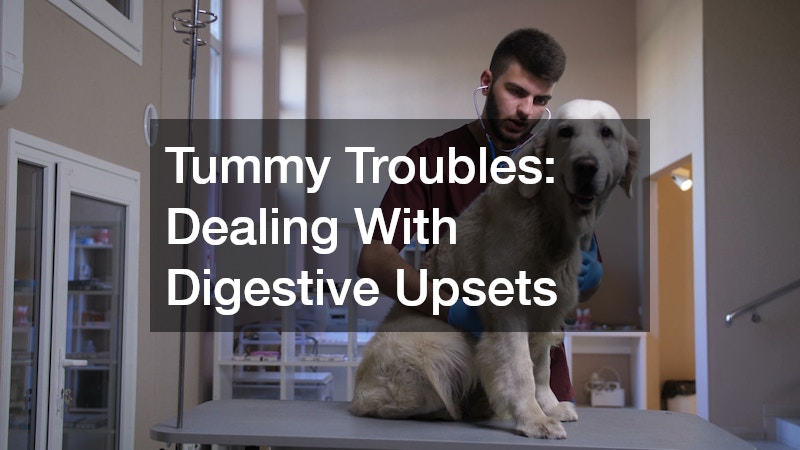
Few things worry dog owners more than seeing their pup refuse food or vomit unexpectedly. Digestive issues are common — from mild stomach upsets to serious conditions like pancreatitis or bloat.
Mild tummy troubles may be caused by eating something unusual (hello, garbage raid), a sudden diet change, or even stress. But if vomiting or diarrhea lasts longer than a day, or if your dog shows signs of pain or dehydration, it’s best to seek veterinary advice. In severe cases, especially when your dog can’t keep fluids down or appears weak, contacting an emergency vet right away can make all the difference.
Tips to Keep Your Dog’s Digestive System Happy
-
Feed a consistent diet: Sudden food switches can upset your dog’s stomach. Transition slowly when changing foods.
-
Watch for food intolerances: Some dogs react poorly to rich or fatty foods. Keep track of what they eat and how they respond.
-
Keep the trash secure: Dogs are experts at finding trouble in the garbage, and spoiled food can cause serious illness.
-
Prevent dehydration: Always provide clean, fresh water, especially after exercise or on hot days.
And remember — certain breeds, like Great Danes and Boxers, are prone to bloat, a life-threatening condition where the stomach twists. If your dog’s abdomen looks swollen or they’re trying to vomit but can’t, it’s an emergency.
Bad Breath or Bigger Problem? Spotting Dental Issues Early
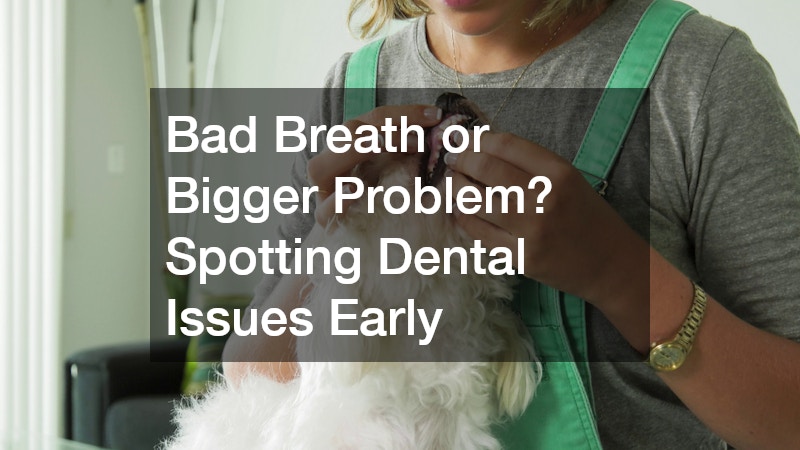
A little doggy breath is expected, but when the smell is strong enough to make you step back, it might be a sign of dental trouble. Periodontal disease affects the majority of adult dogs and can cause more than just bad breath — it can lead to pain, tooth loss, and even organ damage if bacteria enter the bloodstream.
You may also notice drooling, bleeding gums, or your dog chewing on one side of the mouth. Small breeds are especially prone to plaque buildup because their teeth are crowded together. Regular checkups at your local animal clinic can help detect these issues early and prevent them from turning into something more serious.
Ways to Keep Your Dog’s Mouth Fresh and Healthy
-
Brush regularly: Brushing a few times a week can make a big difference in preventing tartar buildup.
-
Offer dental chews: These help scrape away plaque and keep the gums stimulated.
-
Schedule professional cleanings: Your vet can clean below the gum line, where toothbrushes can’t reach.
-
Check for warning signs: Dropping food, pawing at the mouth, or refusing to eat could point to dental pain.
Dental care often gets overlooked, but maintaining oral health not only improves your dog’s comfort — it can extend their life.
Joint Pain and Arthritis in Aging Pups
As dogs get older, their joints naturally start to wear down. Arthritis and joint pain are especially common in large breeds, overweight dogs, and those with past injuries. You might notice your pup having trouble getting up, climbing stairs, or even losing interest in walks they once loved. Left unchecked, joint issues can lead to muscle loss and a decrease in overall quality of life.
The good news is that while arthritis can’t be cured, it can be managed. Early detection and consistent care make a huge difference in keeping your dog mobile and happy. Regular visits to veterinary hospitals can help monitor joint health, adjust treatment plans, and ensure your pup is getting the right therapies to stay comfortable.
How to Support Joint Health
-
Maintain a healthy weight: Extra pounds put extra strain on joints.
-
Provide soft bedding: Cushioned, orthopedic beds reduce pressure points.
-
Low-impact exercise: Swimming and gentle walks help maintain muscle strength without over-stressing joints.
-
Supplements and vet-approved meds: Glucosamine, chondroitin, and omega-3s can help ease stiffness and inflammation.
Don’t ignore subtle signs — a little limping or reluctance to move can progress quickly. With the right care plan and support from your veterinary team, senior dogs can still enjoy active, comfortable golden years.
Ear Infections: Why Your Dog Keeps Shaking Its Head
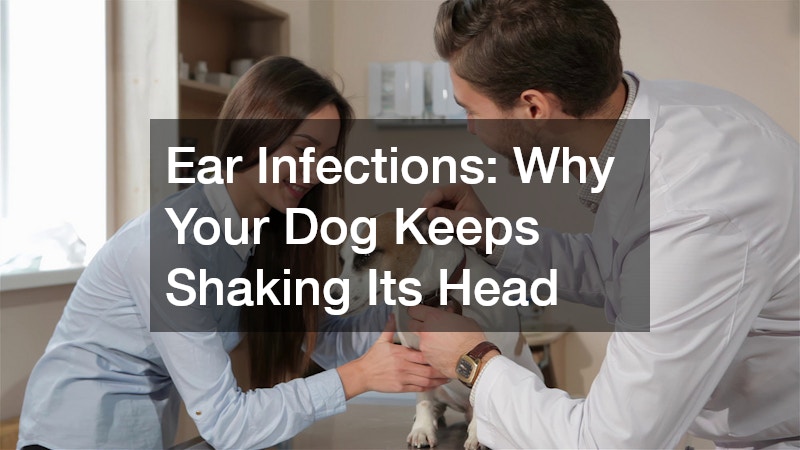
If your dog is shaking their head like they’re at a rock concert, chances are something’s bothering their ears. Ear infections are incredibly common, especially in breeds with floppy ears or lots of hair in the ear canal. They can range from mild irritation to painful infections that affect your dog’s hearing and balance.
Moisture, wax buildup, or trapped debris can create a perfect environment for bacteria and yeast to thrive. You may notice redness, foul odor, or your dog scratching at one ear more than the other. In persistent or severe cases, a visit to an animal hospital may be necessary to properly diagnose the infection and prescribe medications or cleaning treatments.
Preventing Ear Problems Before They Start
-
Keep ears dry: Gently dry your dog’s ears after baths or swimming sessions.
-
Clean regularly: Use vet-approved ear cleaners to remove wax and debris.
-
Check for foreign objects: Grass seeds or dirt can easily get lodged in the ear canal.
-
Watch for recurring infections: Frequent flare-ups may point to allergies or underlying skin issues.
Left untreated, ear infections can cause serious discomfort and even affect hearing. So if your dog’s ear looks red or smells funky, don’t wait — a quick check-up can spare them a lot of pain.
Obesity and Overeating: Keeping Your Dog at a Healthy Weight
An extra treat here and there may seem harmless, but over time, those calories add up. Canine obesity is one of the fastest-growing health issues among pets today, and it can lead to heart disease, diabetes, and joint problems. Being overweight also makes exercise harder, which can create a cycle of inactivity and further weight gain.
Sometimes, owners don’t even realize their dog is overweight — those fluffy coats can be deceiving! You should be able to feel your dog’s ribs without pressing too hard, and they should have a visible waist when viewed from above. Incorporating dog training into daily routines can help with portion control, treat management, and encouraging more active play, making healthy habits easier to maintain.
How to Keep the Pounds Off
-
Measure meals: Follow feeding guidelines rather than guessing portions.
-
Choose healthy treats: Swap high-calorie biscuits for carrot sticks or apple slices (just avoid the seeds).
-
Encourage exercise: Daily walks, fetch, and puzzle toys help burn calories and keep your dog mentally stimulated.
-
Schedule regular weigh-ins: A quick check at the vet can help track progress and catch weight gain early.
Maintaining a healthy weight isn’t about restriction — it’s about balance. Your dog will feel better, move easier, and likely live longer with a proper diet and routine activity.
Heartworm and Parasites: Tiny Threats With Big Consequences
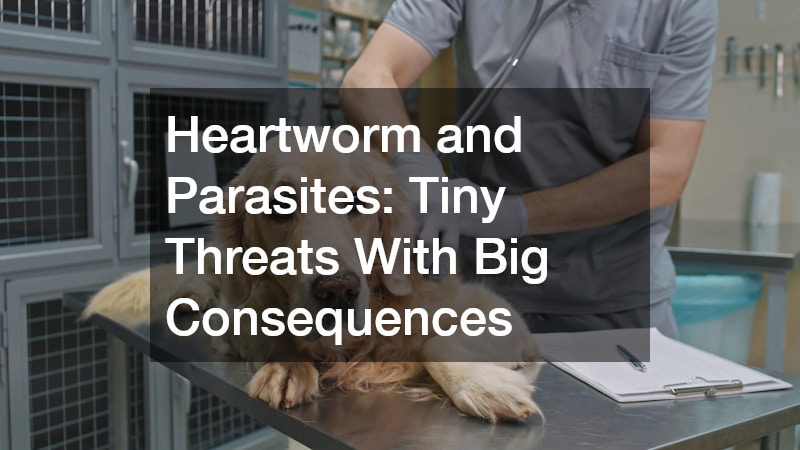
Parasites may be small, but they can cause massive problems for your dog’s health. Heartworms, fleas, ticks, and intestinal parasites are all common, and prevention is always easier than treatment. Even a minor infestation, like a few fleas hiding in your dog’s fur, can quickly become a full-blown problem if left unchecked, leading to anemia or severe itching.
Heartworm disease, spread by mosquito bites, affects the lungs and heart and can be fatal if not treated. For example, a dog with heartworms may start coughing, become unusually tired during walks, or show signs of fainting. Other parasites, like roundworms, hookworms, or tapeworms, can cause digestive issues, weight loss, and anemia. You might notice a dog scooting its rear across the floor or vomiting worms after a heavy infestation. Even external parasites like ticks can carry diseases such as Lyme disease, causing lameness, fever, and lethargy.
In severe cases, dogs may need urgent care from emergency veterinarians to manage life-threatening complications caused by heartworms or heavy infestations. For instance, a dog with advanced heartworm disease might require hospitalization, intensive medication, or even surgery to remove blockages caused by the worms.
Keeping Parasites Away
-
Use preventive medications: Monthly heartworm and flea/tick preventives are essential year-round, not just in summer. Even dogs that stay mostly indoors can be exposed to mosquitoes or ticks brought in on clothing or other pets.
-
Regular vet checkups: Routine blood and stool tests can detect parasites early. Puppies are especially vulnerable, and regular screenings can catch infections before they become serious.
-
Clean living spaces: Wash bedding, vacuum often, and keep the yard tidy to reduce exposure. Parasite eggs can survive in soil, carpets, and even on toys.
-
Avoid risky water or soil: Parasites thrive in contaminated environments, so supervise your dog outdoors. For example, stagnant ponds, puddles, or public dog parks can harbor parasites like Giardia or hookworms.
The best approach is consistency. Skipping even one dose of heartworm prevention can leave your dog unprotected for weeks — and treatment is far tougher than prevention. With careful monitoring and preventive care, you can protect your dog from these tiny but dangerous threats.
Anxiety and Stress: Helping Your Dog Feel Safe and Calm
Dogs experience emotions just like we do, and stress or anxiety can take a serious toll on their well-being. Common triggers include loud noises, separation from family members, or changes in environment. You might notice pacing, whining, destructive chewing, or even accidents in the house.
While occasional stress is normal, chronic anxiety can lead to behavioral and physical health problems. The goal isn’t to eliminate all stress but to help your dog cope better with it. Consulting with veterinarians can help identify any underlying medical issues contributing to anxiety and guide safe strategies for managing stress.
Tips to Ease Your Dog’s Anxiety
-
Create a safe space: A cozy crate or quiet room gives your dog a spot to retreat to when overwhelmed.
-
Stick to routines: Predictable schedules for meals and walks provide comfort and stability.
-
Exercise regularly: Physical activity helps release energy and reduce stress.
-
Try calming aids: Some dogs benefit from anxiety wraps, soothing music, or pheromone diffusers.
-
Work with a trainer or vet: Professional help can address severe separation anxiety or fear-based behavior.
Patience goes a long way. With love, structure, and positive reinforcement, even anxious dogs can learn to relax and feel secure in their world.
Final Thoughts
Being a dog owner means more than walks and cuddles — it means keeping an eye out for changes in behavior, appetite, or energy that might signal something’s wrong. Most of these health issues are manageable or preventable with regular checkups, good nutrition, and daily care.
By staying informed and proactive, you can help your furry friend enjoy more tail wags, longer walks, and a healthier, happier life by your side.
